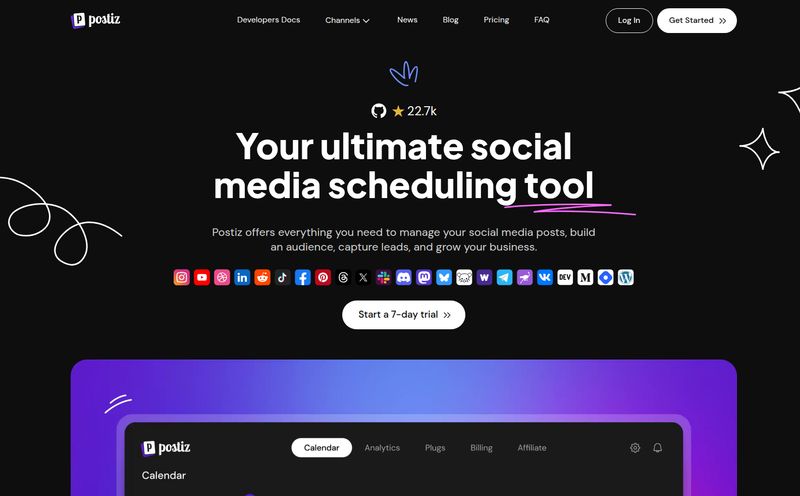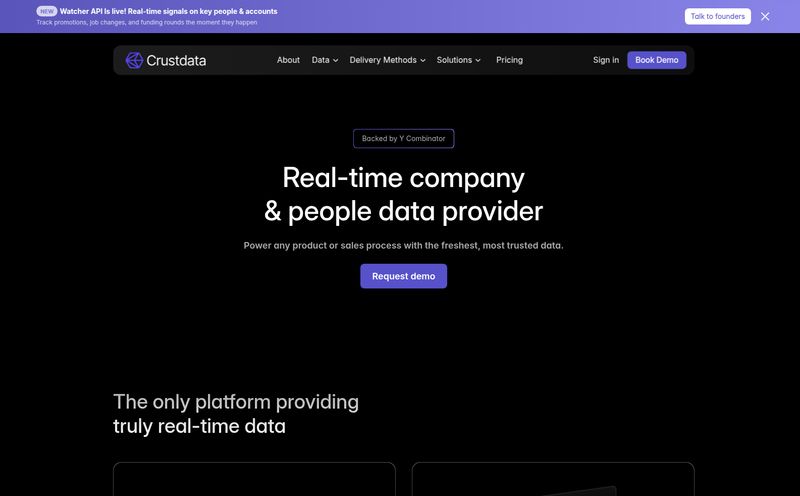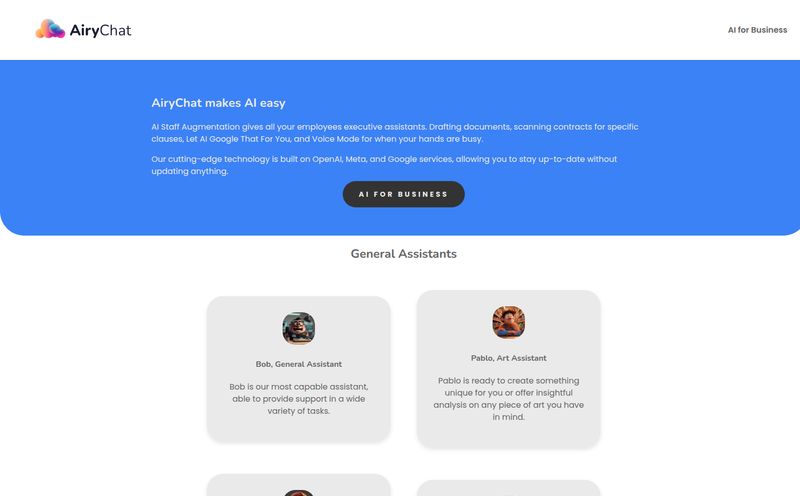If you’ve ever been on the receiving end of a Request for Proposal (RFP), you know the feeling. It lands in your inbox like a 100-page brick, filled with vague requirements, impossible deadlines, and enough legaleze to make a lawyer's head spin. I’ve lost more weekends to these monsters than I care to admit. Coffee, spreadsheets, frantic Slack messages to the tech team at 2 AM... it's a rite of passage for almost any growing business, and frankly, it stinks.
It’s a necessary evil, right? You want that big contract, you gotta play the game. For years, the process has been a brutal, manual slog of copy-pasting from old documents, hunting down stats, and praying your formatting doesn't explode when you convert to PDF. It’s the business equivalent of trying to assemble IKEA furniture in the dark, with half the instructions missing.
So, when I first heard about a tool that promised to use AI to automate this whole mess, my first thought was, “Yeah, right.” We’ve all seen AI that spits out generic, soulless text. But the name RFPX kept popping up. I was skeptical, but the memory of my last RFP-induced migraine was fresh enough to make me curious. Could this actually be the tool that lets us reclaim our weekends? I had to find out.
So What Exactly is RFPX?
In simple terms, RFPX is an AI-powered platform designed specifically to generate complex, data-heavy documents. Think public tenders, security questionnaires, those beastly RFPs, and detailed proposals. If you’ve ever seen it called Such Much AI, that was its former name; they’ve since rebranded to focus on their core strength.
This isn't just another ChatGPT wrapper or a fancy template filler. RFPX is built from the ground up to understand the structure and nuance of professional bids. The whole idea is to feed it your company’s information—case studies, technical specs, team bios, all that good stuff—and let the AI draft high-quality, personalized responses in minutes, not days. The promise is huge: slash creation time, reduce human error (we all make copy-paste mistakes), and produce a better final document.

Visit RFPX
The Features That Actually Matter
Any platform can throw a list of features on a landing page. But after messing around with it, a few things really stood out to me as being more than just marketing fluff. These are the things that address the real-world headaches of proposal management.
The AI Generation Engine
This is the heart of the machine. The AI doesn’t just pull pre-written paragraphs. It seems to actually understand the questions in a tender and generate relevant, context-aware answers based on the knowledge base you've provided. This is where it gets interesting. You’re not just automating the boring parts; you’re creating a first draft that is surprisingly coherent and on-brand. It’s like having a junior proposal writer who never sleeps or complains.
Taming the Beast of Long-Form Documents
My biggest fear with AI for this kind of work has always been context. It's easy for a language model to lose the plot after a few pages. RFPX claims to support complex, long-form documents without losing accuracy, and from what I've seen, it holds up. It can handle a massive document and keep the thread, ensuring section 7.3.b actually relates back to the point made in the executive summary. For anyone who's had to manually cross-reference a 150-page tender, this feature alone feels like a miracle.
Navigating the Compliance Maze with GDPR and the EU AI Act
Okay, this is a big one, especially for companies working with European clients. Staying compliant with regulations like GDPR is a non-negotiable, and the new EU AI Act adds another layer of complexity. Building compliance checks and considerations directly into the document creation process is incredibly smart. It’s a huge weight off your shoulders, turning a potential legal and operational minefield into a simple, automated check. This shows the developers aren't just thinking about text generation; they’re thinking about the entire business process surrounding it.
My Honest Take on the Experience
Alright, so how does it feel in practice? It's surprisingly smooth. The idea of setting up a "customizable workflow" sounds a bit jargony, but it's pretty intuitive. You’re essentially teaching the AI about your business. The more quality data you give it—past proposals, product one-pagers, security docs—the smarter it gets. There's an upfront investment of time here, for sure. You can't just sign up and expect a perfect proposal in five minutes.
But once it's set up? It's a different world. The feeling of uploading an RFP and getting a solid, 80% complete draft back in the time it takes to make a coffee is... well, it's pretty amazing.
Now, let's address the big con: this does not eliminate the need for a human. And it shouldn't. The AI is a powerful co-pilot, not the pilot. You still need an expert to review, refine, and add that final human touch of strategy and persuasive flair. The AI handles the grunt work, freeing up your experts to do what they do best: strategize and win the deal. Anyone who thinks they can just hit 'generate' and 'send' without a review is asking for trouble. But that's not a flaw in RFPX; it's just the reality of using AI responsibly in 2024.
Let's Talk Money: The RFPX Pricing Breakdown
This is where the rubber meets the road for many businesses. RFPX is positioned as a professional tool, and the pricing reflects that. It's not a casual-use app, and it probably shouldn't be. Here’s a quick look at their plans (as of writing this):
| Plan | Price per Month | Credits | Best For |
|---|---|---|---|
| Starter | $59 | 5 credits | Freelancers and very small teams with occasional needs. |
| Basic | $279 | 25 credits | Small to mid-sized teams with a regular flow of proposals. |
| Pro | $589 | 50 credits | Established teams handling complex, long-form documents frequently. |
| Growth | $1099 | 100 credits | Larger organizations or agencies managing multiple clients/pipelines. |
| Enterprise | Custom | Custom | Large-scale operations needing tailored solutions and support. |
Note: A "credit" typically corresponds to generating one document. Always check the latest details on their pricing page.
My take? Yes, the price tag might cause a sharp intake of breath for a solo operator. But for an agency or a B2B sales team, you have to calculate the ROI. How many hours does your team spend on a single RFP? 40? 80? 100+? If you can cut that time by 50-70%, the Basic or Pro plan pays for itself almost instantly. It's an investment in efficiency, not an expense.
Who Should Be Using RFPX (And Who Shouldn't)?
This tool isn't for everyone, and that's okay. It shines brightest for specific groups:
- B2B Sales and Proposal Teams: This is the bullseye. If your team is constantly responding to RFPs, RFIs, and security questionnaires, this is a no-brainer.
- Public Sector Bidders: Companies bidding on government and public tenders will find the compliance and long-form document features invaluable.
- Growth-Stage Companies: When you start going after bigger, more complex contracts, your old copy-paste method breaks down. RFPX helps you punch above your wieght.
Who might want to hold off? If you’re a freelancer who writes maybe two simple, 5-page proposals a month, this is probably overkill. You can get by with a good template and a bit of manual work. The value of RFPX scales with the complexity and volume of the documents you create.
The Final Verdict: Is RFPX Worth the Hype?
After spending some quality time with it, I'm moving from "skeptical" to "cautiously evangelistic." RFPX isn't a magic wand that writes winning proposals for you while you sip margaritas. But it is an incredibly powerful force multiplier.
It transforms the most soul-crushing part of the process—the tedious, repetitive, and error-prone drafting—into a fast, semi-automated workflow. It frees up your best people to focus on strategy, client relationships, and the nuanced persuasion that actually wins deals. It tackles the compliance beast and isn't afraid of a 200-page document.
For the right company, RFPX won't just save time; it will fundamentally change the way you approach business development. And it might just give you your weekends back. For me, that alone makes it worth every penny.
Frequently Asked Questions about RFPX
- What's the real difference between RFPX and a general tool like ChatGPT?
- Think of it as a specialist versus a generalist. ChatGPT is a brilliant all-rounder, but RFPX is specifically trained and designed for the structure, format, and compliance needs of proposals and tenders. It has built-in workflows and features for long-form context that general models don't.
- Is RFPX difficult to set up?
- There is an initial setup phase where you need to feed it your company's knowledge base. The more effort you put in here, the better your results will be. It’s not plug-and-play, but it's an investment that pays off. Their higher-tier plans also offer dedicated support for setup.
- What is a "credit" in the pricing plans?
- Typically, one credit is consumed when you generate one full document. So the Starter plan with 5 credits allows you to generate five complete proposals or RFPs in a month.
- How does RFPX handle my confidential company data?
- This is a critical point. Their emphasis on GDPR and EU AI Act compliance is a strong indicator of their focus on security. Your data is used to create a private knowledge base for your account only and is not used to train models for other customers.
- Can I customize the documents with my own branding?
- Yes. The platform is designed to produce personalized, data-driven documents. This includes incorporating your company's specific information, tone of voice, and likely branding elements to ensure the final output looks like it came from you, not a robot.
- Is this only for tech companies?
- Not at all. While tech companies often face complex security questionnaires, any industry that relies on detailed proposals or public tenders—construction, consulting, healthcare, professional services—could see massive benefits.
Reference and Sources
- RFPX Official Website
- RFPX Official Pricing Page
- European Parliament Press Release on the EU AI Act
- Official EU GDPR Information Portal



